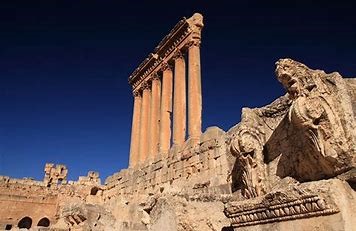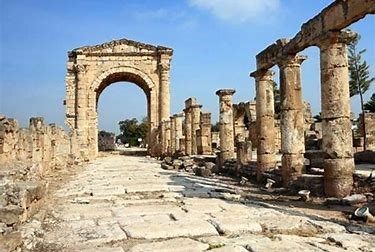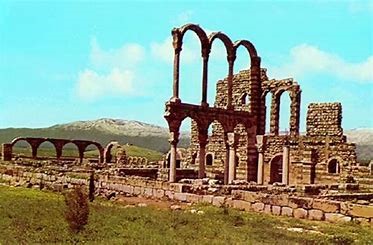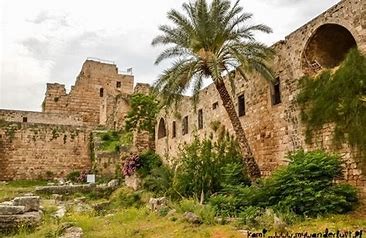« LEBANON »
A small country with a big heart

Day 1 | Arrival to Beirut Airport |
Day 2 | Beirut – South Region - Beirut |
Day 3 | Beirut – the Bekaa Valley - Beirut |
Day 4 | Beirut– Mont Lebanon Region- Beirut |
Day 5 | Departure to the Airport |
Itinerary
Day 1 :
Beirut
Arrival to Beirut, Meet and Assist at Rafic Al Hariri International Airport.
Transfer to Hotel.
Day 2 :
Beirut – Echmoun- Sidon – Tyr - Beirut
Beirut to Echmoun (40 km) Echmoun to Sidon (3.9 km)
Sidon to Tyr (39 km) Tyr to Beirut (83 km)
Breakfast at the hotel.
Departure towards the South. Visit to the Phoenician Temple of Echmoun. Then visit the capital of the South, Sidon (Saida). The third great Phoenician city that experienced its golden age before Christ during the Persian era, between the end of the 6th century and the middle of the 4th century BC. This city, founded by the Phoenicians, is protected by the Sea Castle, a fortress built by the Crusaders. You will visit the Audi Soap Museum, the souks, the grand caravanserai known as Khan el-Franj (Hotel of the Franks), built by Fakhreddine II, which testifies to the importance of economic and cultural relations maintained between the Emir of Lebanon and the Western states. Lunch at a restaurant in the region. Let's continue to Tyre, visit Tyre, the pearl of the coast nestled on a small rocky island, where you will discover the Greco-Roman stadium, the ruins of the cathedral built by the Crusaders, and the two ports of King Hiram. Visit the necropolis, the hippodrome, the Roman baths, and the Arch of Triumph. Return to Beirut. Overnight at the hotel.

Day 3 :
Beirut – Baalback – Anjar – Ksara - Beirut
Beirut to Baalback (62 km) Baalback to Anjar (46 km)
Baalback to Ksara (37 km) Ksara to Beirut (50 KM)
Breakfast at the hotel.
Departure for the Bekaa Valley. At an altitude of 1,150 meters, Baalbeck (city of Baal) emerges like a green jewel on the slopes of the Anti-Lebanon Mountains. The famous acropolis, built by the Romans as a tribute to the sun god Baal, dominates the Beqaa Valley with its gigantic proportions. It is the culmination of an imperial project that reflects Roman will, wealth, and power. They also show a strong local Semitic influence in their layout and overall economy. In fact, the triad of Jupiter, Venus, and Mercury that was worshiped there was grafted onto an ancient local triad. Then visit Anjar, the only site dating back to the Umayyad period. Lunch at a local restaurant in Baalbek. Continue to visit the Ksara Caves, which were established during the time of the Jesuit Brothers in 1857. Wine tasting... Return and overnight at the hotel.

Day 4 :
Beirut- Jeita Grotto- Harissa – Beirut
Beirut to Jeita (23 km) Jeita grotto to Harissa (10 km)
Harissa to Byblos (23 km) Byblos to Beirut (40 km)
Breakfast at the hotel.
Departure to visit the Jeita Grottoes, located 20 kilometers north of Beirut, in the green valley of Nahr el-Kalb. They are renowned worldwide for the richness of their formations. Closed during the war and used as a military outpost, the caves were reopened in 1995. They were operated by a German company, Mapas, which invested 11 million dollars in the rehabilitation of the site. The caves consist of two galleries discovered in 1836 and 1858. You can venture into these galleries for about 700 meters to admire the maze of stalactites and stalagmites. The lower gallery is crossed by an underground river that can be visited by boat. Then visit "Our Lady of Lebanon" in Harissa, an immense statue of the Immaculate Conception overlooking the bay of Jounieh. Built in the late 19th century, the statue of the Virgin Mary towers over a sanctuary (a chapel in the pedestal). Enjoy a seafood lunch at a restaurant with a sea view. Continue to Byblos to visit a city deeply rooted in history, dating back at least 7,000 years (5,000-4,000 BC). The current name of the city is derived from the Greek word for "papyrus" (paper). Byblos was not only a major commercial center and producer of papyrus but also famous for being the place where the first Phoenician writings were discovered. It was the birthplace of the Alphabet. Its small port was once a thriving trading center, where the cedar wood of Lebanon was shipped throughout the region in ancient times. The archaeological site of Byblos has been designated as a UNESCO World Heritage Site. Visit the citadel, the Roman amphitheater, and the royal tombs. Explore the Church of St. John the Baptist, the old souks (markets), and the city walls. Overnight in Byblos.

Day 5 :
Departure
Breakfast at the hotel, Transfer to the airport
Hotels
Hotel | City | Nights |
Warwick Palm Beach 4*or similar | Beirut | 4 |
The above rates include the following services:
• Meet and greet at the airport
• All transfers in private air-conditioned vehicles
• Professional private French-speaking guide throughout the days of the tour
• All entrance fees to the mentioned sites
• 4 nights of half-board accommodation in the mentioned hotels or similar
• Lunches
• 2 small bottles of water per person per day.
The above rates do not include the following services:
• Tips for the guide and driver
• Drinks during meals
• All personal expenses
• Airline tickets
• Visa
• Medical insurance
• Anything not mentioned in the itinerary
• Optional paid activities
Note: The itinerary may be modified on-site based on technical constraints or unforeseen circumstances. However, all visits will still be provided.


